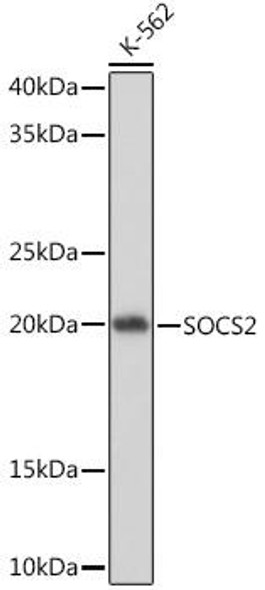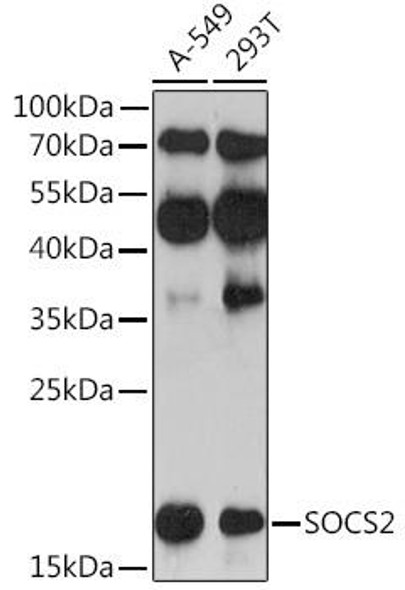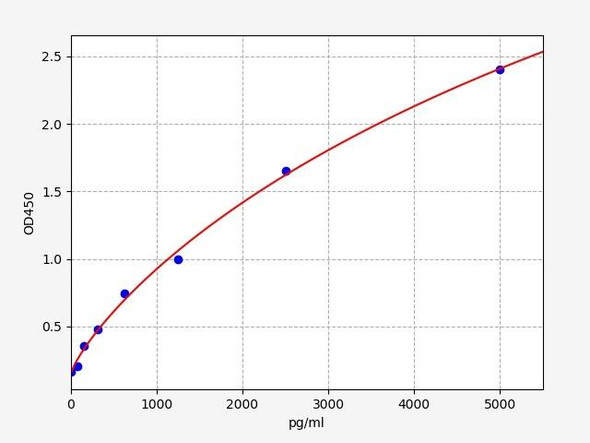| UniProt Protein Function: | SOCS2: SOCS family proteins form part of a classical negative feedback system that regulates cytokine signal transduction. SOCS2 appears to be a negative regulator in the growth hormone/IGF1 signaling pathway. Probable substrate recognition component of a SCF-like ECS (Elongin BC-CUL2/5-SOCS-box protein) E3 ubiquitin- protein ligase complex which mediates the ubiquitination and subsequent proteasomal degradation of target proteins. Interacts with IGF1 receptor, prolactin receptor and growth hormone (GH) receptor. Associates with the Elongin BC complex. By a subset of cytokines, including EPO/erythropoietin and CSF2/GM-CSF. High expression in heart, placenta, lung, kidney and prostate. |
| UniProt Protein Details: | Chromosomal Location of Human Ortholog: 12q Cellular Component: cytoplasm; cytosol Molecular Function:insulin-like growth factor receptor binding; protein binding; growth hormone receptor binding; SH3/SH2 adaptor activity; protein kinase inhibitor activity; JAK pathway signal transduction adaptor activity Biological Process: positive regulation of signal transduction; cytokine and chemokine mediated signaling pathway; negative regulation of insulin receptor signaling pathway; protein ubiquitination; regulation of signal transduction; JAK-STAT cascade; response to estradiol stimulus; cellular response to hormone stimulus; negative regulation of protein kinase activity; regulation of cell growth; negative regulation of JAK-STAT cascade; aging; negative regulation of apoptosis |
| NCBI Summary: | This gene encodes a member of the suppressor of cytokine signaling (SOCS) family. SOCS family members are cytokine-inducible negative regulators of cytokine receptor signaling via the Janus kinase/signal transducer and activation of transcription pathway (the JAK/STAT pathway). SOCS family proteins interact with major molecules of signaling complexes to block further signal transduction, in part, by proteasomal depletion of receptors or signal-transducing proteins via ubiquitination. The expression of this gene can be induced by a subset of cytokines, including erythropoietin, GM-CSF, IL10, interferon (IFN)-gamma and by cytokine receptors such as growth horomone receptor. The protein encoded by this gene interacts with the cytoplasmic domain of insulin-like growth factor-1 receptor (IGF1R) and is thought to be involved in the regulation of IGF1R mediated cell signaling. This gene has pseudogenes on chromosomes 20 and 22. Alternative splicing results in multiple transcript variants. [provided by RefSeq, Jul 2012] |
| UniProt Code: | O14508 |
| NCBI GenInfo Identifier: | 20178092 |
| NCBI Gene ID: | 8835 |
| NCBI Accession: | O14508.1 |
| UniProt Secondary Accession: | O14508,O14542, O95102, Q9UKS5, A8K3D1, |
| UniProt Related Accession: | O14508 |
| Molecular Weight: | 198 |
| NCBI Full Name: | Suppressor of cytokine signaling 2 |
| NCBI Synonym Full Names: | suppressor of cytokine signaling 2 |
| NCBI Official Symbol: | SOCS2 |
| NCBI Official Synonym Symbols: | CIS2; SSI2; Cish2; SSI-2; SOCS-2; STATI2 |
| NCBI Protein Information: | suppressor of cytokine signaling 2; CIS-2; STAT induced STAT inhibitor-2; STAT-induced STAT inhibitor 2; STAT-induced STAT inhibitor-2; cytokine-inducible SH2 protein 2; suppressor of cytokine signaling-2 |
| UniProt Protein Name: | Suppressor of cytokine signaling 2 |
| UniProt Synonym Protein Names: | Cytokine-inducible SH2 protein 2; CIS-2; STAT-induced STAT inhibitor 2; SSI-2 |
| Protein Family: | Suppressor of cytokine signaling |
| UniProt Gene Name: | SOCS2 |
| UniProt Entry Name: | SOCS2_HUMAN |






